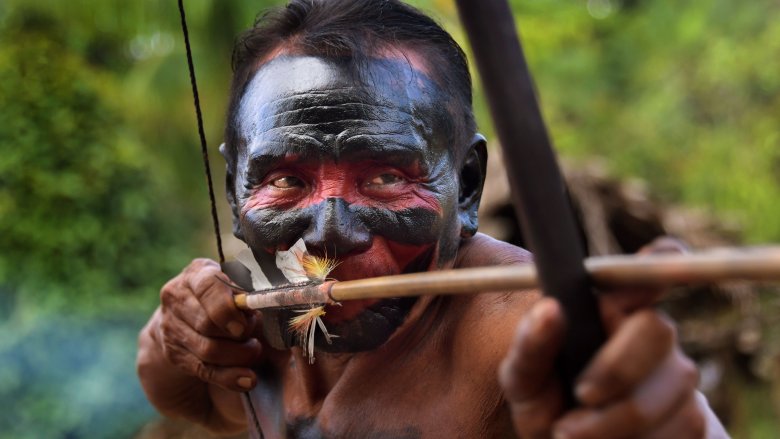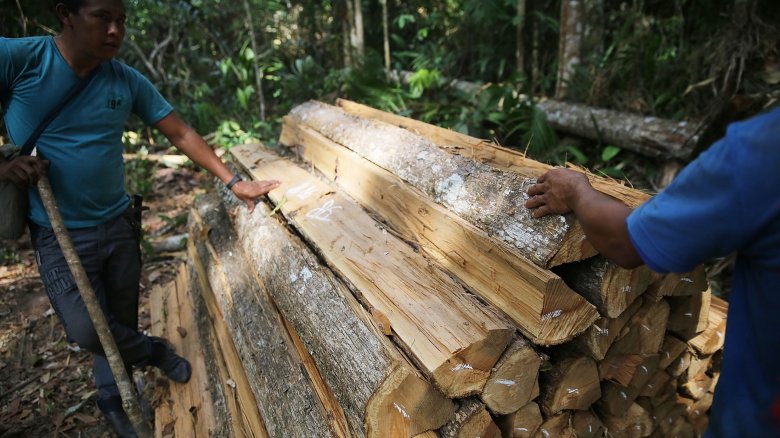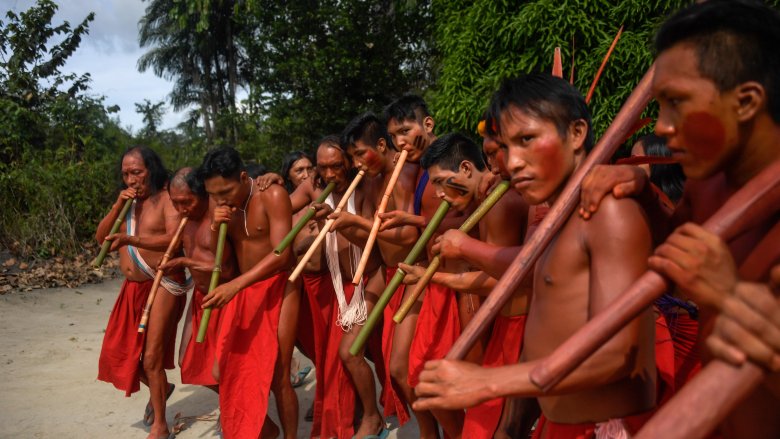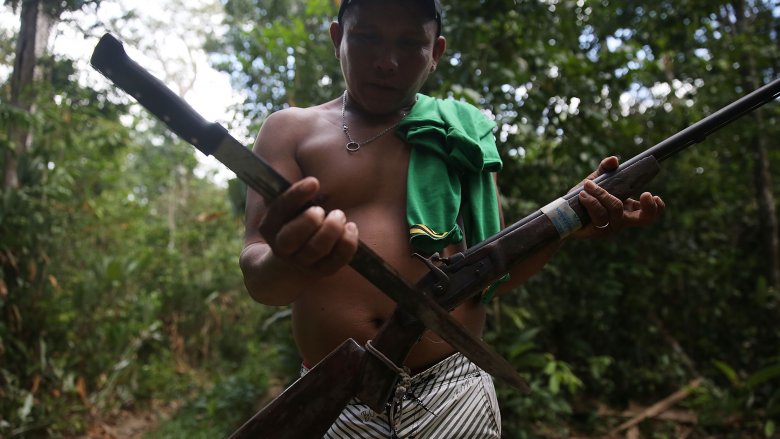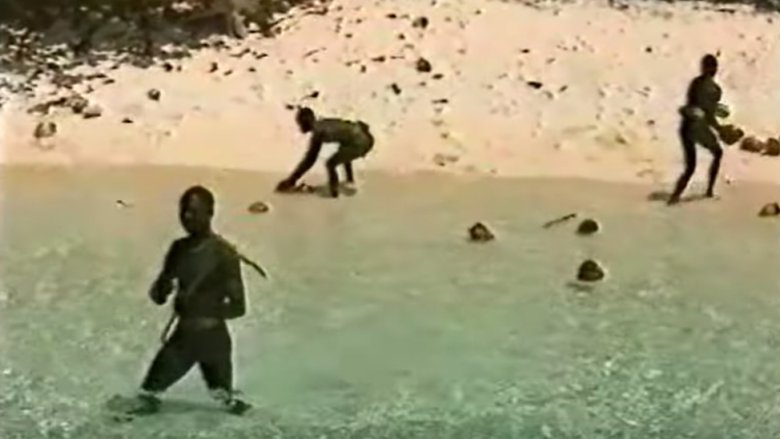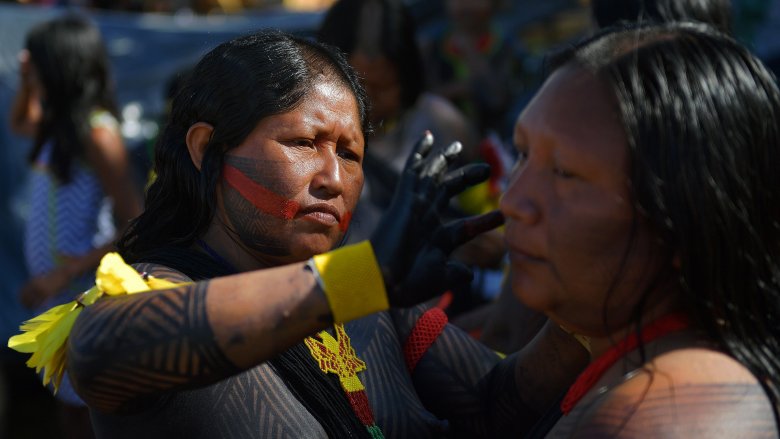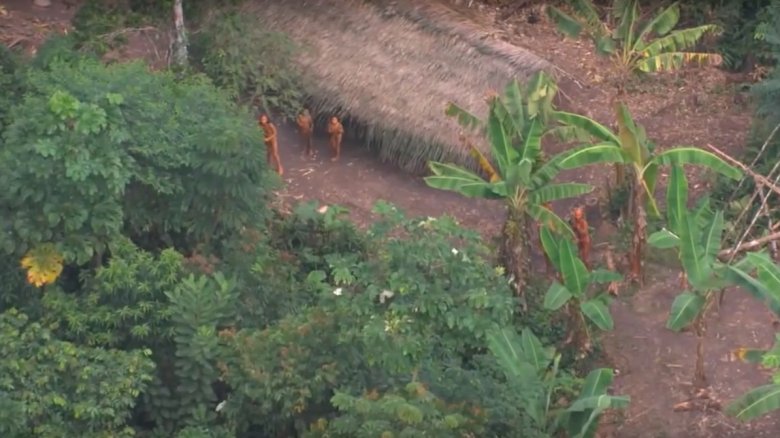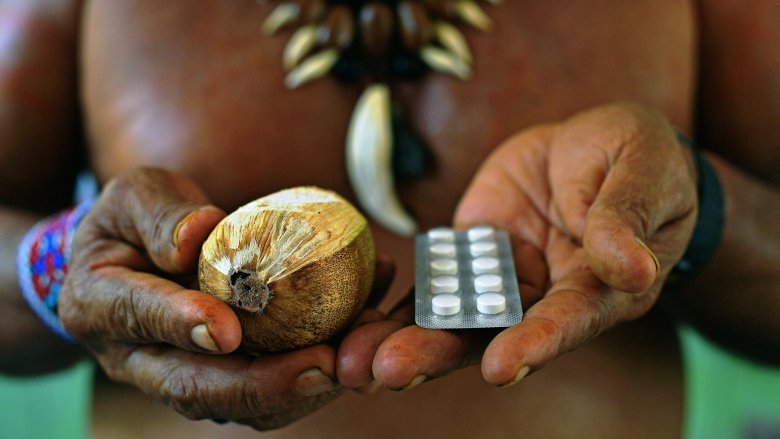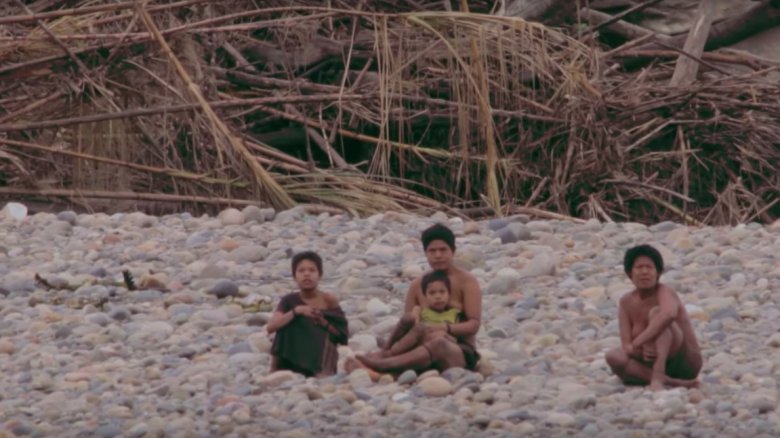Strange Facts About Uncontacted Tribes On Earth
It's kind of hard to believe that a world that gave us smartphones, virtual reality, and self-driving cars could have anyone left living in it who has never heard of smartphones, virtual reality, or self-driving cars, and no, we're not talking about your grandma. Our world is wonderful and weird and so vast that there are actually still communities living in remote places that hunt and gather their food, live in straw huts, and have little to no contact with the modern world.
Collectively known as "uncontacted," it's worth starting with a baseline understanding that these aren't ignorant people — they've probably seen airplanes, many have had communication with other tribal people who do live in the modern world, and they're very much aware that people who live outside their communities have access to technology that's beyond anything they have in their own communities. So we'll use Survival International's definition of "uncontacted" as "no peaceful contact with anyone in the mainstream or dominant society." In the whole world, there are roughly 100 communities that fit into that definition. Here are some amazing facts about a few of them.
Don't talk to us, just give us your stuff
So-called "uncontacted" people don't live in a tropical bubble. They know that other humans have amazing technology like metal tools, airplanes, and 24/7 access to every single Walking Dead episode. (Well, maybe they don't exactly care about that last one.) Past experience has taught them that outsiders can't be trusted, and also that outsiders have cool stuff. So if you were a tribal leader and you knew those two facts, what would you do?
In some South American villages, raids by uncontacted people are commonplace, and sometimes even an accepted part of life. According to National Geographic, villages along the Upper Envira River are particularly vulnerable to being attacked and pillaged — tribesmen are fond of stealing clothes, cooking pots, and tools like axes and machetes.
Most of the time, the tribesman target indigenous villagers, which probably has as much to do with proximity as it does with vulnerability. (It's a lot easier to attack a small village than it is to attack a city.) And villagers tend to be tolerant of such attacks, too, even going so far as calling the raids "harvesting" instead of "stealing." Just try using that one the next time you download a copy of Photoshop from that website that really doesn't look like it's affiliated with Adobe.
We'll just stick with bananas and roasted spiders, thanks
If only uncontacted people knew about pizza and Starbucks, they'd for sure come out of the jungle and introduce themselves, right? Well, no, not exactly. Many of these groups already have introduced themselves, or rather, were forcibly introduced to people who wanted to cut down their forests and maybe use them for cheap labor.
There's a historical precedent for the fear that uncontacted people have of outsiders. According to Wired, in the 1980s and early 1990s, gold miners wiped out a large group of uncontacted people in southern Venezuela. In Peru, loggers are allowed to indiscriminately harvest forests, whether there are indigenous people living in them or not. Go a little further back to the "rubber boom" in the late 19th century, and it wasn't uncommon for developers and companies involved in the rubber trade to displace or enslave tribespeople. Many uncontacted groups have a cultural memory of these things, and most of the time they'd rather just stay on their own lands and forego the pizza, even if it means subsisting on a diet of bananas and large spiders. They have no reason to trust outsiders.
Actually, we're tired of bananas and roasted spiders
On the other hand, when your supply of bananas and spiders starts to dwindle because of all the deforestation, pizza starts to sound pretty good, even if you have to order it with a side of exploitation and some cultural annihilation to wash it all down. According to National Geographic, it's starting to become a lot more common for previously uncontacted groups to come out of the jungle and willingly initiate first contact. Sometimes first contact is with government officials; other times it's just with whoever happens to be there, whether it's average citizens or tourists. Sometimes there's a peaceful exchange of greetings and gifts, and sometimes there's a violent altercation. The tribespeople usually indicate that they're in search of food or goods that will help them survive, which seems to suggest that it's becoming more difficult to eek out a living in the jungles of South America. But in another incident, a group of previously uncontacted tribespeople indicated that they'd come under attack by intruders who were possibly drug traffickers or people involved in an illegal logging operation.
Such encounters have led officials in Peru to question their long-standing policy of no contact. One official said groups that actively seek contact with the outside world are usually seeking help but are also unwittingly subjecting themselves to danger, which means the government has a responsibility to make contact as peaceful and safe as possible for everyone involved.
If colds could kill (hint: they can)
Imagine calling your boss to tell him you can't come to work because you have a cold and you're literally gonna die, and now imagine if that were the actual truth. People who have been living isolated in the jungle don't get exposed to common cold viruses, which means they have no natural immunity. And if a cold can kill you, then you really don't stand a chance against other much more sinister viruses like measles, chicken pox, and influenza.
According to Time, in 1910 a Brazilian engineer embraced a tribesman from the Nambikwara tribe, which would have been a touching symbol of peace and friendship except for the part where the Brazilian engineer was carrying around a bunch of pathogens, which he then passed on to the tribesman, which then killed around 4,500 people, most of whom died from influenza, whooping cough, and, yes, the common cold.
Today, contact with the uncontacted often means convincing tribespeople to get vaccinated, which apparently is a much easier task than convincing a privileged, white housewife living in suburban California to do the same thing, which certainly says something about which group is technically more primitive. Anyway, the practice of vaccinating people who choose to come out of the jungle should help protect them from another peaceful contact with the outside world, though it won't do a whole lot of good if the illegal loggers/drug traffickers show up again. But it's something, anyway.
We don't like you, but you have cool stuff
Most uncontacted people aren't living totally primitive lives — there's nearly always some relic from the modern world somewhere in their communities, whether it's an aluminum cooking pot or a machete. They get this stuff by raiding other villages, or sometimes trading, or sometimes just finding stuff that's been abandoned. In the Amazon, many uncontacted tribes are sort of semi-connected to the outside world, usually through contact with tribal villagers who do have contact with modern people.
Other groups are totally isolated. An uncontacted group called the Sentinelese, who live on remote islands in the Indian Ocean, often salvages metal from old shipwrecks and uses it to make weapons. A few Amazonian tribes even possessed guns, and they got them years before they ever encountered the culture that made them. So it's not actually very likely that there are any tribes left that are entirely "untouched" by the modern world. If nothing else, most isolated groups have at least seen aircraft, so they're aware of technology even if it's not something they're actively pursuing.
In some cases, though, tribal people actually regress and become less developed after contact with the outside world. According to Survival International, some groups grew their own food, but then had to retreat further into the jungle as the modern world started to threaten them. Now they subsist primarily on food they hunt and gather.
Go away, but leave the cookware, please
It's 22 miles from the island of North Sentinel to the nearest inhabited land mass, which doesn't seem that far if you've got a power boat and a large helping of chutzpah. Because according to The American Scholar, the Sentinelese not only want nothing to do with you (or anyone else), they kill outsiders on sight.
Point: In 1867 they attacked a bunch of shipwrecked sailors, and in 1896, they killed an escaped convict who was unlucky enough to drift all the way to their island. In 1974, when a film crew thought it might be fun to take some cameras and a couple anthropologists over to North Sentinel, the Sentinelese greeted them with arrows and then destroyed all the peace offerings they'd brought with them, except the aluminum cookware because evidently all uncontacted people understand how awesome aluminum cookware is. In 2004, just after the devastating Indian Ocean tsunami, a Sentinelese tribesman took a shot at a helicopter that was basically just doing a welfare check. In 2006, a couple guys who were fishing illegally near the island got too close and were killed.
There was once a time when the Indian government hoped to gain the trust of the islanders, but besides those awesome cooking pots and some coconuts, the Sentinelese seem to be mostly immune to bribery. The Indian government finally gave up trying to contact them back in the '90s.
Meet my uncle cousin grandpa
The real problem with life in a small, isolated group is not the whole dying when a tourist sneezes on you thing or the whole getting-really-sick-of-bananas thing, it's that pesky genetic diversity thing. A 2014 study at the University of Portland says you need a minimum of 10,000 individuals to have a genetically healthy and diverse population, so where does that leave tribes that number in the hundreds or sometimes even in the dozens?
In trouble, as it turns out, and many uncontacted tribes seem to understand this — at least that's one possible explanation for the common practice of kidnapping women and children from other tribes. And as their numbers dwindle, either because tribes have been exposed to outside pathogens or because they've been attacked and killed by loggers and miners, that problem is only going to get worse.
According to Time, members of the Mashco Piro tribe sometimes try to lure villagers into the forest, which is a bit less insidious than just kidnapping, yet somehow more creepy. You can't really blame them, though, because there's not much that people won't do in the name of love and romance. Maybe what they really need is a jungle version of Tinder.
Just paint yourself red and pretend like you live in this hut, will you?
Just like people pretend climate change isn't happening, or the Moon landing was faked, or kale is edible, some people also say there's no such thing as an uncontacted tribe, despite all the photographic evidence to the contrary. According to Time, anyone with a vested interest in logging or mining will say that "uncontacted people don't exist," just like Exxon likes to say that fossil fuels aren't contributing to climate change, and people who sell kale chips like to say that they're better than potato chips. In some cases the denial goes all the way to the top — in 2007, the president of Peru declared the whole concept of uncontacted tribes was made up by environmentalists trying to stop oil and gas drilling and also make people eat kale chips. (He didn't actually say that last part, but he was probably thinking it.)
One oil executive chimed in to say he was pretty sure there was no such thing as uncontacted tribes because no one had ever seen an uncontacted tribe, which is sort of like saying that giant pandas didn't exist until 1869 when they all just spontaneously generated somewhere in China because up until then they'd never been seen by a Westerner. There's also the problem of all those aerial photographs of uncontacted tribespeople waving their spears at their observers, which must also be staged, you know, like the Moon landing.
The ethics of trying to be ethical
Despite everything we know (or don't know) about uncontacted people, no one seems to agree on whether or not contact would be a good thing or a bad thing. For example, author Jeffrey Kluger has asked if it's more ethical to leave uncontacted people alone and let them survive as they always have, or if it's actually unethical to leave them without access to medical care and technology that could save lives and help them thrive.
Generally speaking, most governments seem to agree that no contact is best for everyone. But some experts like Arizona State University professor Kim Hill, who has conducted decades of research on the subject, think limited contact would benefit some of the tribes, in particular the Mashco Piro, who have recently begun initiating contact with outsiders. Hill believes dispatching translators, cultural experts, and a team of doctors who would remain dedicated to the tribe for a period of up to two years would make them less vulnerable to contact with less benevolent people.
Survival International begs to differ. "It's their human right to remain isolated," said the organization's campaign officer in Peru. Which is fine, if that's really what they want, but not everyone thinks so. "They all want outside interactions," Kim said, and they're only avoiding it because they fear extermination." Someone could just ask them, except that would be kind of hard to do without, you know, contacting them.
And to your left you can see some humans
If history is anything to go by, contacting the uncontacted usually ends in disaster. According to Survival International, tribes that try to join modern society often aren't successful. First they have to survive Western pathogens, which might decimate their communities. If they do choose to leave the jungle, they don't usually end up integrated into modern society, either, at least not in the way we like to think they would be — that is, they aren't all sent off to college on scholarships and given cushy desk jobs after graduation. Many will become beggars or prostitutes, and most will end up living in poverty, so life in Western society is arguably worse than life in the jungle. Eventually the culture dies, even if the people don't, which is a tragedy all by itself.
And even tribes that stay in the jungle after contact aren't guaranteed a life free of exploitation. In the Andaman Islands (where the Sentinelese are still resisting contact) the indigenous Jarawas have to endure tour companies advertising them as an attraction, sort of like celebrity homes in Hollywood but without the high-tech security and actual privacy. One company's marketing copy reads, "[The Jarawas] are the wonder of the modern world, for they feed on raw pigs. ... Their pitch black skin and red eyes will leave you dazzled in case you happen to meet them." So basically, it's a safari where you gawk at humans. Awesome.
Evil spirits taste great when steamed in banana leaves
Finally, some of what you've heard about uncontacted people is true. According to the Smithsonian, in Papua New Guinea, there are groups who still practice cannibalism. Some Korowai clans have never been contacted by outsiders, but those who have seem happy to explain why they sometimes eat the flesh of their own people.
The Korowai have no understanding of viruses and bacteria, so when someone gets sick, they blame it on a "khakhua," which is a witch that invades the body of a human. So that means if you're Korowai and your friend or relative dies, there's a pretty good chance everyone will think it was your fault, because you're actually a khakhua in disguise. And then they will kill and eat you. Reason: Because khakhuas kill people by eating them from the inside out, so it's sort of like an eye for an eye, except it's a human-part-steamed-in-banana-leaves for a human-part-steamed-in-banana-leaves. Yum.
That doesn't necessarily mean you should fear uncontacted people. (But you totally should because their system of justice is not exactly similar to ours, so they're not going to be afraid to put an arrow in your heart, if you deserve it.) It's probably a good idea to just let them choose to be contacted or not choose to be contacted as they see fit, while you just remain content to look at their pictures on your smartphone.
